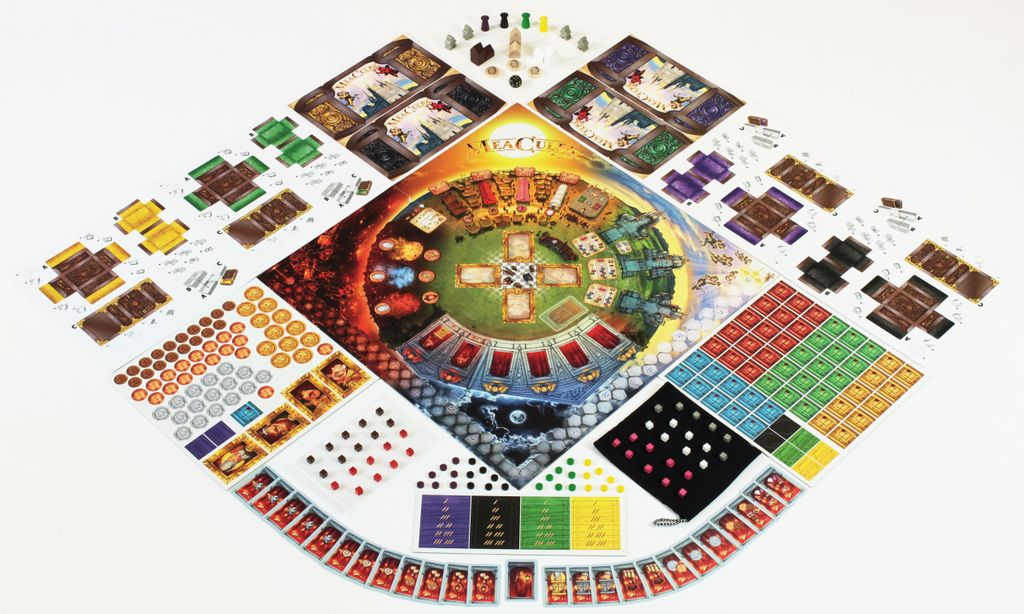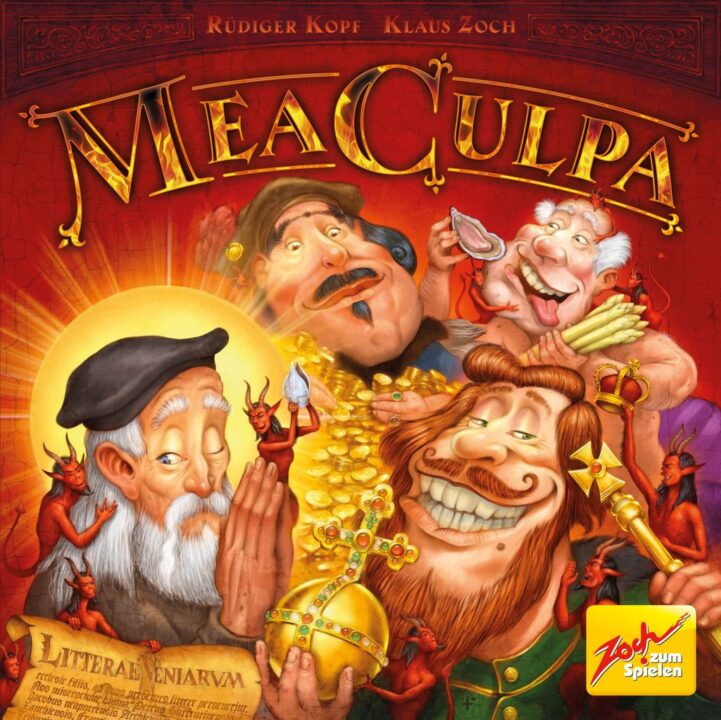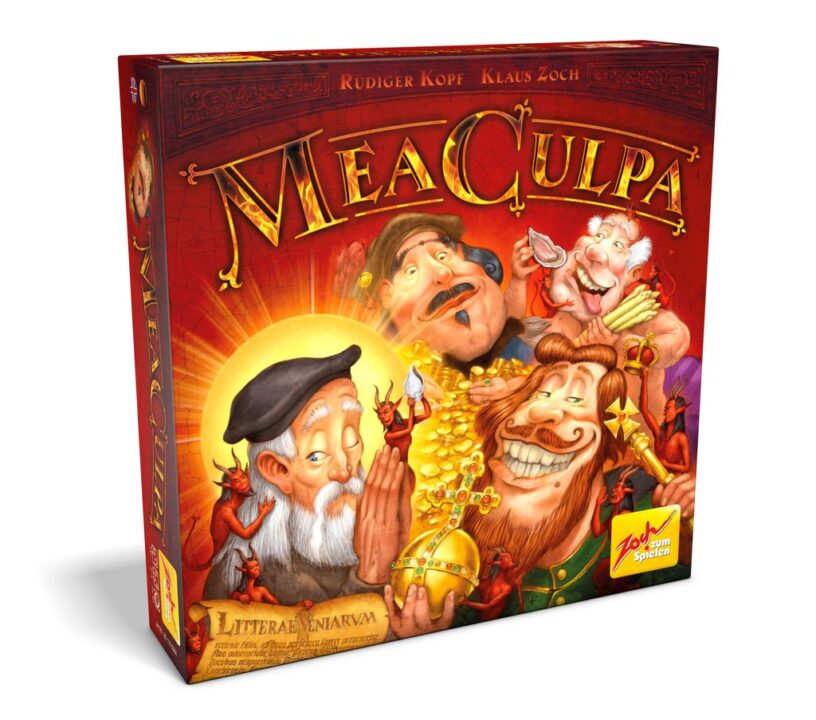Hey there, board game lovers! Today, we’re diving headfirst into a wild and wacky review of ‘Mea Culpa.’ This game has it all: lively player interaction, a hilarious theme, and detailed artwork that’s a feast for the eyes. But is it worth your time and money? Keep reading as we break down the gameplay mechanics, player interactions, and replay value to give you the full scoop!
How It Plays
Setting up
First, set up the board with the cathedral in the center. Each player picks a color and takes the matching pieces. Place the sinners in the waiting hall and shuffle the action cards.
Gameplay
On your turn, you’ll move your pilgrim, perform actions like sinning or building, and gather resources. You can also bid in auctions, trade with others, and try to avoid the darker corners of the game. Each choice affects your progress.
Winning the game
The game ends when the cathedral is finished or all sinners are redeemed. The player with the most salvation points or the least sin points wins! Keep your strategies versatile and watch out for those sneaky gambits from your buddies.
Want to know more? Read our extensive strategy guide for Mea Culpa.
Exploring the Gameplay Mechanics of Mea Culpa
Mea Culpa, a game with a name that sounds like a Latin class flashback, is all about the seven deadly sins. Imagine Dante’s Inferno but with more laughter and fewer existential crises. In this game, you and your friends will compete to collect as many indulgences as possible, which sounds risky but is surprisingly fun.
The game kicks off with you selecting a character card. Each character has a special ability. Some make your life easier, others just add a bit of chaos. Then, you move to the resource management phase, where you’ll gather indulgences, sin tokens, and temptation cards. Let me tell you, managing these is like trying to balance a chair on one leg while juggling. Not easy, but very rewarding when you nail it.
What’s really unique about Mea Culpa is its balancing act between strategy and luck. The auction mechanic is where strategy shines. You have to bid on various sins and indulgences, trying to outsmart your buddies. But there’s also the ‘Wheel of Fortune’ spin, which can completely mess up your master plan. I find it both thrilling and frustrating. One minute you’re on top of the world, the next you’re spiraling into the abyss of sin tokens.
Another cool thing is the ‘Confession’ phase. You get to confess your sins and potentially get rid of those pesky sin tokens. It’s like a mini redemption arc every round. But beware, if you’re too greedy, it will backfire. This adds a layer of risk and reward that’s quite interesting.
Next up, we’ll see how all this impacts player interaction, and trust me, it gets personal.

Player Interaction in Mea Culpa
When you gather your friends around the table for Mea Culpa, prepare for an evening filled with lively banter and strategic clashes. This game thrives on interaction, both direct and indirect. Every decision you make can impact your fellow sinners, and the temptation to sabotage their plans is ever-present.
One of the standout elements is the bidding wars. Players must outbid each other for valuable resources, and trust me, it gets heated. I once saw my friend Bob turn redder than a tomato after losing a crucial auction by a single coin. The tension and excitement during these moments bring everyone to the edge of their seats.
Trading is another key aspect of player interaction. You can exchange resources and relics in a desperate bid to outdo the competition. Believe me, the negotiations get intense. It’s like a mini stock market, but with more backstabbing. And don’t get me started on the pilgrimages. Sending your characters to different locations can block others and create a web of strategic dilemmas that keep everyone guessing.
Let’s not forget the confessions. Here, players can choose to confess their sins, which grants them immediate benefits but also alters the game’s dynamics. Watching my buddy confess a hefty list of misdeeds only to gain a stack of indulgences was both hilarious and frustrating. It’s moments like these that make Mea Culpa a social experience, rather than just a game.
If you think player interaction sounds thrilling, wait until you see the theme and artwork. Stay tuned for the next section, where I’ll spill all the beans!

Theme and Artwork: Mea Culpa’s Divine Comedy
Picture this: You’re a pilgrim in the medieval times. No, not the Thanksgiving kind. You’re on a quest through purgatory, trying to gain favor with the Church. But instead of being pious, you’re spending your resources on bribes and indulgences to get a VIP seat in heaven. That’s the offbeat theme of ‘Mea Culpa’. It’s like Monty Python met Dante’s Divine Comedy and decided to make a game out of it.
The artwork in ‘Mea Culpa’ is nothing short of remarkable. We’re talking about vibrant, detailed illustrations that pop right off the board. The little devils and monks drawn by the artists are both cheeky and menacing, adding a whimsical yet eerie vibe to the game. The colors are rich and the iconography is clear, making it easy to understand what’s going on at a glance.
One of my favorite bits? The indulgence cards. These cards hold different sins and whimsies, each illustrated with a mix of dark humor and gothic flair. The board itself is a tapestry of medieval drama, with each section depicting a different layer of purgatory. It’s more than just eye candy; it genuinely contributes to the immersive experience.
And let’s not forget the tokens and player pieces. They’re like tiny pieces of art you get to move around. It’s a tactile delight that almost makes you forget you’re trying to bribe your way to divine favor.
Next up, let’s talk about how ‘Mea Culpa’ keeps you coming back for more.

Replay Value of Mea Culpa: A Delightful Sinful Experience
Replay value can make or break a board game. With Mea Culpa, I’m pleased to say it’s a game that keeps drawing you back. The first time I played, I knew there was something special about it. The game has a lot of depth, with various strategies to explore. In our group, no two games have ever felt the same. One round, I was a repentant sinner, trying to gain favor with the Pope. The next, I was a cheeky con artist, trying to outsmart my friends. Talk about versatility!
Mea Culpa shines in its ability to shift gears. The game’s multiple paths to victory ensure everyone has their own plans cooking, and it keeps you on your toes. The variable player powers spice things up even more. You might play as a different character each game, adding layers of strategy and fun. Plus, the game’s unique scenarios keep the setup fresh. Honestly, who knew repenting sins could be this entertaining?
Another factor boosting replay value is the dynamic market system. Prices and availability change each game, making you think hard about your next move. Do you save up for a lavish indulgence or spread your wealth to cover more sins? Choices, choices!
If I had to nitpick, some people might find the game’s humor gets old after a while. But for my group, it’s like an old sitcom—always good for a chuckle.
So, do I recommend Mea Culpa? Absolutely! It’s got the replay value to keep hitting the table, and you’ll be laughing all the way to the confessional.
Conclusion
Mea Culpa is a mixed bag of strategy and luck, with its humorous theme and engaging player interaction. The game keeps you on your toes with dynamic mechanics and varied strategies. If you enjoy a bit of chaos in your board games, you’ll likely have a blast. However, for those who seek balanced gameplay with minimal luck, it might leave you wanting more. Overall, it’s worth a try for its unique theme and lively player engagement. This concludes my review of Mea Culpa!

